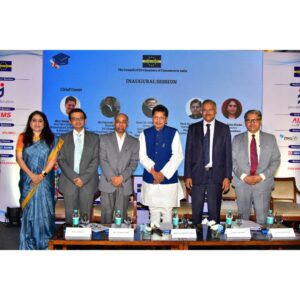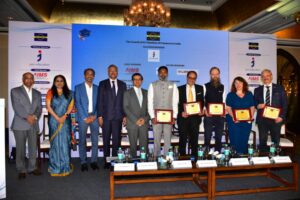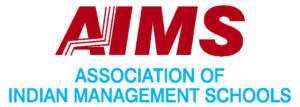The Council of EU Chamber of Commerce in India (EU Chambers) organised 2nd EU India Education Summit 2023 – Nurturing Globally Responsible Citizens for Sustainable Future on Friday, March 17, 2023 at 9.00 am at The Taj Mahal Palace, Mumbai.
The Summit was organised under the aegis of the Education Committee of the Chamber headed by Chairman, Prof. Dr. Uday Salunkhe and Co-Chairman Prof. T. M. Sathyanarayanan. The Summit was graced by Shri Deepak Kesarkar, Hon’ble Cabinet Minister-Maharashtra School, Education & Marathi Language, Government of Maharashtra.
Mr. Peeyush Kaushik, President, EU Chambers and welcomed the attendees. He also expressed his gratitude towards the Chief Guest for accepting the invite of the Chambers and for gracing the Summit despite of having a very busy schedule.

Prof. Dr. Uday Salunkhe, Chairman, Education Committee and Group Director, Eisenhower Fellow 2012, Welingkar Institute of Management Development and Research (We School) introduced the theme of the Summit to the attendees. He also briefed the objectives of the Education Committee of the Chamber and the objective of the Summit. He mentioned that this Summit is the second edition of the first Summit which was held last year and since it was a big hit the Committee decided to conduct second edition of the Summit.
Prof. Suhas Pednekar, Former Vice Chancellor, Mumbai University & Member, Education Committee, EU Chambers briefly introduced the Chief Guest, Shri Deepak Kesarkar, Hon’ble Cabinet Minister-Maharashtra School, Education & Marathi Language, Government of Maharashtra.
Shri Deepak Kesarkar highlighted how Maharashtra is working on developing NEP and found common ground in the government’s efforts to recognise education in one’s mother tongue with the European dignitaries present in the audience.
He mentioned that though English is a common language in Indian schools and colleges, most European countries teach subjects to students in their mother tongues. He stated that for research, you need scientific data, not language. He also highlighted that Indians can fulfil Europe’s labour needs through various partnerships.
Dr. Renu Shome, Director, EU Chamber formally proposed a vote of thanks. She thanked the Chief Guest for gracing the Summit. She also thanked all the Sponsors for their support.

The inaugural session was followed by two panel discussion. The theme of the First Panel Discussion was “Changing Landscape of Transnational Partnerships for Higher Education & Skills”
The discussion, which was moderated by Prof. Dr. Salunkhe, Chairman, Education Committee and the esteemed speakers were Mr. Erik af Hällström, Consul General, Consulate General of Finland in Mumbai, Mr. Ferenc Jari, Consul General, Consulate General of Hungary in Mumbai, Ms. Vanesa Álvarez Franco, Economic and Commercial Counsellor, Economic & Commercial Office in Mumbai, Embassy of Spain, and Mr. Arun Thekkadath, Chief Representative Officer, Neso India, the Dutch arm of promoting higher education programmes.
Mr. Erik mentioned that Finland’s achievements is a trailblazer in the educational field and were also highlighted as a model for the world to go by, especially for India’s young students. In Finland, most schools are given autonomy and the ability to facilitate sports and social interactions instead of overloading students with subjects. He also added that the country is also motivated by India’s achievements, especially in the IT sector.
Talking about Hungary Mr. Ferenc said Hungary has also started taking steps to bring international students and have started working on initiatives to attract them.
He said that Hungary is contributing around 600 million Euros towards scholarships for developing countries, 200 Indian citizens have the opportunity to study in Hungarian universities through the Indian government, the expenses of which are taken care of. So overall the country understands the function of globalisation and the need to build transnational partnerships.
Ms. Vanessa said Spain can be a primary destination for international students, especially Indians. We also see a future where students from both countries can experience their study journey in each other’s nations. Such initiatives will help build a broader linkage between both Spain and India as currently, the relationship is not that developed. She also mentioned that people-to-people exchange is necessary.
Mr. Arun said the Netherlands, which is known for its touristy features, has also enhanced its academic capabilities over the years which plays into the country’s mobility goals. Indian students are the second largest group of international pupils in the Netherlands and are offered a lot of scholarships. In the last four years the country has witnessed that most Indian students are studying in the Netherlands and coming back to India to put their skills to use.
With Covid-19 opening up the idea of remote education and work, European countries shared varied ideas on continuing with the model and its future.
The second-panel discussion saw representation of University representatives, namely Prof. Christer Nygren, Lecturer in Innovation Management, Malardalen University, Sweden, Mrs. Maud LE BARS, South Asia Area Manager India Office Global School, Rennes School of Business, France, and Prof. Lars Hulgaard, Prof of Social Entrepreneurship, Roskilde University, Denmark. The discussion also had the presence of Mr. Kartikeya A, OSD to Minister of Finance & Skill Development, Government of Andhra Pradesh, and Mr. Koustubh Kanade, Vice-President Marketing & Executive Projects, B Braun Medical.
The discussion was moderated by Prof. T. M Sathyanarayanan, Director, Overseas Education Consultancy Services & Co-Chairman, Education Committee, EU Chambers and Prof P K Shajahan, Dean, of Academic Affairs, TISS Mumbai & also Member of Education Committee of the Chamber.
The Theme for the discussion was Building an Inclusive Educational Ecosystem for Global Challenges through EU-India stakeholders
Prof. Lars Hulgaard explained that all aspects of society are important in building sustainable education. One example is the advent of ChatGPT in November which is now being used across the globe in academics. He mentioned that it’s interesting to see how the chatbot is being used to teach students and can provide an optimistic view of technology to others.
Mrs. Maud LE BARS shared how she explored the role of technology in cross-border learning. She said that the university is trying its best to explore a lot of opportunities in India across regions. She appreciated states such as Andhra Pradesh, which are spearheading a lot of tech initiatives that can prove to be helpful. She thinks technology is allowing a lot of innovation and change.
Christer Nygren feels that Indian students have proved to be increasingly important for European countries and hence his university is trying to make access to scholarships easier for Indian students. Erasmus scholarship has also become popular among them,” he stated.
Mr. Kartikeya spoke about the development of Education in the state of Andhra Pradesh. He mentioned how the state is focusing on training their students in various skills.
Mr. Kanade shared the perspective of the industry. He mentioned that now all the companies are focusing on having skilled employees and hence here its very important for the education sector to focus on skills and development of the students.,
The Summit was attended by over 150 distinguished guests from the fields of business, education, civil service, and more.
The Event was sponsored by Platinum Sponsor – Jaro Education, Gold Sponsor – AIMS, Silver Sponsors – Zing HR and Valmiki Group. The Banking Partner was the event was HDFC Bank and Media Partner was Free Press Journal.
Platinum Sponsor


